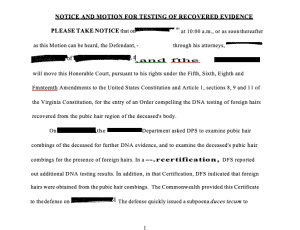-
×
 Order Appointing Counsel in Capital Case
Order Appointing Counsel in Capital Case
- Vendor:
Lawyers Help Lawyers
-
×
 Motion to Vacat final Pretrial Conference
Motion to Vacat final Pretrial Conference
- Vendor:
Lawyers Help Lawyers
Subtotal: $75.00
Showing 181–195 of 439 resultsSorted by price: low to high
Motion to provide the defense an opportunity to inspect and copy all physical evidence which the plaintiff intends to introduce into evidence.
A motion filed in this case, when it was determined by the defense team that a video surveillance was not obtained by the investigators or DA until it was to late. The judge denied the motion in part but allowed defense to use the lack of obtaining the evidence in their case.
Motion for new DNA testing on recently found identification samples (hair, bodily fluids, blood, etc) found at the crime scene.
The Value of DNA Evidence
During a sexual assault, for example, biological evidence such as hair, skin cells, semen, or blood can be left on the victim’s body or other parts of the crime scene. Properly collected DNA can be compared with known samples to place a suspect at the scene of the crime.

Motion for prosecution to turn over all evidence against the Defendant, and for the defense to preserve evidence until investigated.
Order for Expungement of DNA Profiles and Samples (Pen. Code, § 299)
Order for Child Support Security Deposit and Evidence of Deposit
RESPONSE OF DEFENDANT TO DEFENDANTS AND THE ESTATE OF MOTION IN LIMINE TO PRECLUDE THE ADMISSION OF EVIDENCE OF SETTLEMENT WITH PLAINTIFF
REQUEST PURSUANT TO ARTICLE 37.07 § 3(g), TEXAS RULES OF CRIMINAL EVIDENCE
DEFENDANT SECOND SUPPLEMENT TO OPPOSITION TO PLAINTIFF’S MOTION TO STRIKE DEFENDANT’S AFFIRMATIVE DEFENSE OF NONPARTY AT FAULT AND TO PRECLUDE INADMISSIBLE EVIDENCE CONCERNING ALLEGED NEGLIGENCE OR FAULT
Most jurisdictions have a procedure for a defendant who alleges that an officer was an aggressor to access the officer’s personnel records. The defense might have to request the records from the prosecution, a different agency that has “custody” of them, or both.
Personnel records often contain citizen complaints and other notations of officer misconduct. The theory behind giving the defense access to them is that documentation of prior acts of aggression by the officer will corroborate the defendant’s claim. And the defense can follow the lead of the personnel files, conducting its own investigation of the officer’s past behavior.
Can the Public Get Police Records?
– Access to records relating to potential police misbehavior isn’t always limited to criminal defendants. Sometimes the public is entitled to information about police behavior of public concern. For example, California has a law saying the following types of police personnel records and records maintained by government agencies have to be made available to the public:
– a record relating to a report, investigation, or finding of a police officer firing a weapon at someone or using force that caused great bodily injury or death
– records having to do with a finding of sexual assault by a police officer against a member of the public, and
– records pertaining to a finding of police officer dishonesty in relation to the reporting, investigation, or prosecution of a case (for example, concealing evidence).
– Under the California law, all kinds of materials that fit into one of the above categories have to be released, including investigative reports, photos, audio recordings, videos, and disciplinary records.
This California law—like so many laws out there—does have exceptions. For example, certain personal information and information that legitimately could endanger someone have to be redacted. Also, an agency holding relevant records can delay disclosure under the right circumstances. An example is delaying disclosure of records relating to an incident involving extreme force by an officer while an investigation of the incident is ongoing.
(Cal. Penal Code § 832.7(b) (2019).)
That there is a process by which to request police personnel records doesn’t mean that defendants automatically get them. In many instances, once a defendant makes a proper request of the personnel records of an officer-witness, the government (whether the prosecution or a different government agency that has the records) must review the files and provide any significant information that helps the defense.
The government typically may lawfully refuse to turn over personnel files if there’s no basis to believe they’re helpful or relevant to the defendant’s case. Fortunately, courts frequently oversee the review process in order to determine whether disclosure of the records would be favorable to the defense.
Consulting a Lawyer
If you want to know whether you have a legitimate chance at obtaining police personnel files, consult an experienced criminal defense lawyer. Your attorney can advise you about the likelihood of getting the records and the procedure involved, both of which depend on your jurisdiction.
REQUEST FOR NOTICE OF 404(b) EVIDENCE
MSJ, Objections to Evidence Sample
Request for Notice of Intent to Use Rule 404(b) Evidence and Incorporated Memorandum of Law
Motion for an order to exclude all evidence and its fruits derived from the “network investigative techniques” code that the Government used to search the Defendant’s personal computer.
 Order Appointing Counsel in Capital Case
Order Appointing Counsel in Capital Case
Lawyers Help Lawyers
 Motion to Vacat final Pretrial Conference
Motion to Vacat final Pretrial Conference
Lawyers Help Lawyers
Subtotal: $75.00


